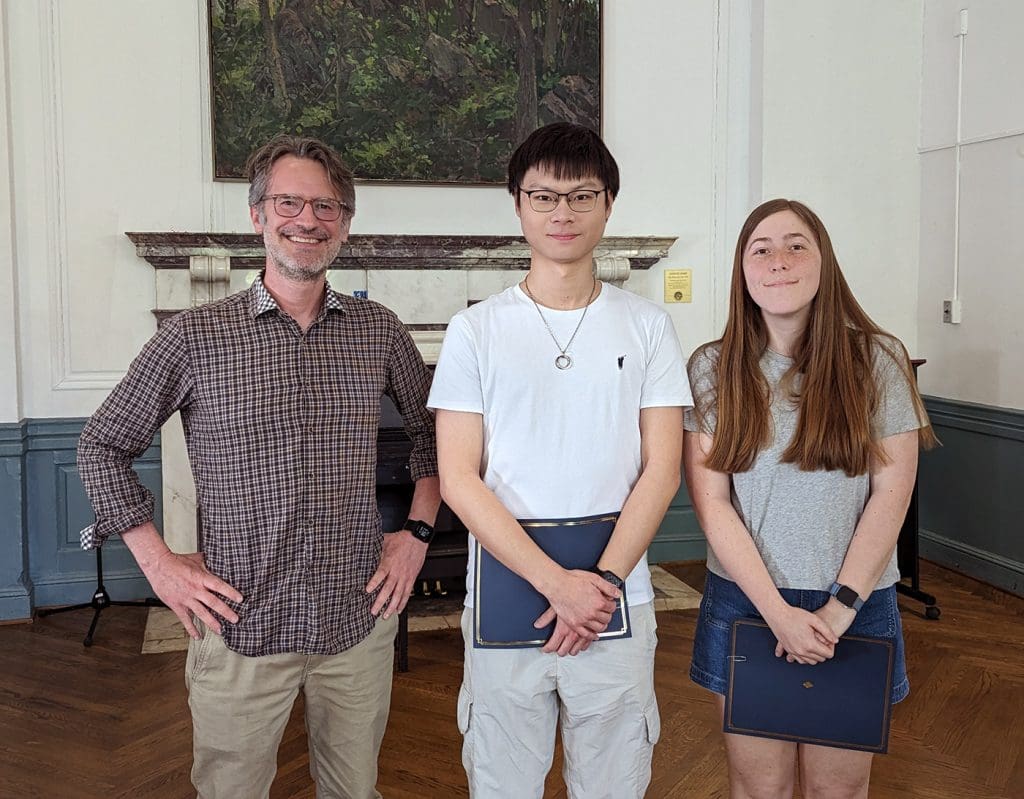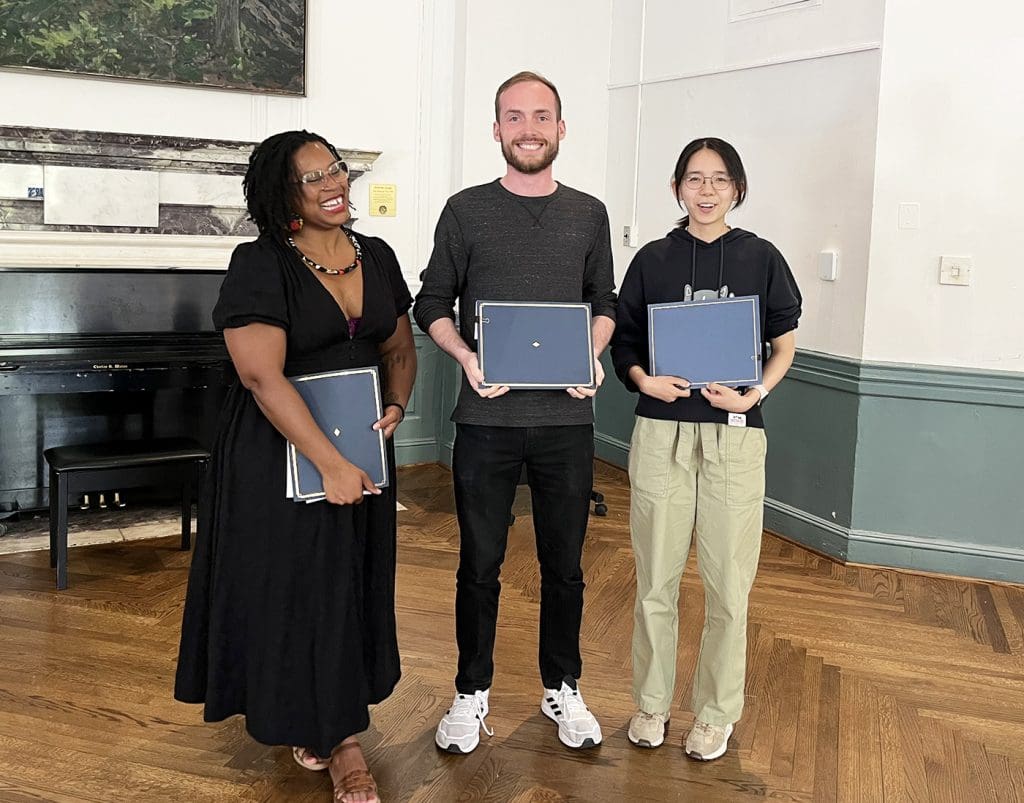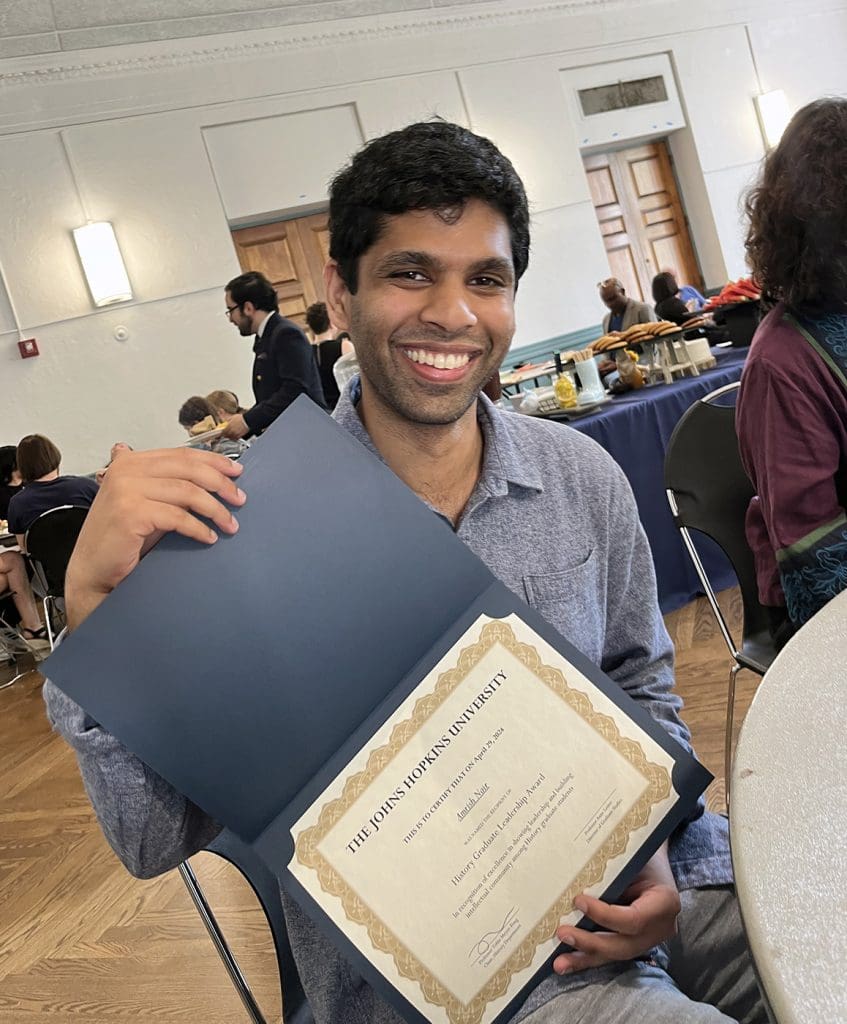
As part of our History end-of-year reception festivities, we awarded the Kouguell, Butler, and Student Leadership Awards.

This year, we split the Kouguell Prize between two outstanding undergraduate senior thesis writers, Sarah Annis, for her thesis titled, “Murder Fines, Jurisdiction, and State Power in Anglo-Norman England,” and Zeqing Li for his thesis titled, “Xiao Xin’an and the Anti-Netherlands Movement: Gender and Nationalism in 1930s China.”
Sarah Annis wrote a thesis analyzing the murder fine in Medieval English pipe rolls using a mix of social, legal, and computational analysis. Her paper resituates the fine in post-conquest England while offering a new way of measuring the fiscal impact of the fine under the reign of Henry II. Even more, she offers a methodological toolkit that has implications beyond this subject and may potentially bring fresh insights across her field.
Zeqing Li’s thesis explored the sexual assault of a Chinese woman, setting the case in the context of changing ideas about gender in early 20th c. China, and the ways both fomented a growing strain of nationalism centered around anti-Netherlands sentiment. If his methodology is more familiar, his paper brings to light a case and a dynamic that has been largely neglected in the field while the writing and his analysis is of a level of sophistication that we believe merits publication.
The Arthur Kouguell Memorial prize was established by the parents and friends of the late Arthur M. Kouguell ’73. The prize is awarded annually by the Department of History to the senior honors thesis that best represents Arthur Kouguell’s commitment to scholarly and humane values.

Similarly, we awarded the Butler Prize to two exceptional papers written by first-year graduate students Ben Barrett and Xueqian Zhang.
Ben Barrett’s paper entitled “Making Marseille ‘Federalist’: The Long Afterlife of the Revolt of 1793″ was deeply grounded in archival work. Barrett offers a “searching, sophisticated argument” to explain how a loyal Marseilliese Jacobin was labeled a counter-revolutionary in the years that followed the Revolution. In doing so, Barrett also makes a powerful and cogent intervention in the classic historiography of the Revolution arguing that its consequences have, for far too long, been measured by events in Paris leaving aside what happened in the rest of France. In crafting his paper, Ben admirably moves between close-readings of letters and trial records long overlooked, to then pan-out and engage larger questions and historiographical debates about the nature of political community, the aftermath of the French Revolution, and the experience of those far from the capital. In doing so, he has opened up a crucial trajectory for future work to reconsider temporal and geographic perspectives on the aftermath of the Revolution and for new interpretations of this pivotal moment in French history, whose effects reverberated far beyond the shores of France.
The committee has also chosen to recognize the exemplary paper written by Xueqian Zhang entitled “The Patriarch in Letters: Masculinity, Family Conflict, and Mythmaking in Late Qing China.” Zhang’s paper unfolds a twined story: one a personal narrative generated through letters exchanged among a prominent family in late Qing China, and another that tells a story of the creation of an ideal of the patriarch as it was reconceptualized throughout the late 19th and early 20th century. In her paper Zhang uncovers the story of Zeng Guofan and his family by surveying thousands of letters, analyzing their multiple reprintings, and considering the significance of later marginalia for what it said about the reception history of Goufan and his image as a patriarch. This was no small feat given that the letters were written in Classical Chinese. Moreover, Xueqian reads the letters through the lens of gender and feminist studies to critique and analyze the Confucian idea of “image politics” and the “ideal patriarch”. The result is a paper that is ambitious and carefully bounded, and that offers a new perspective on family history and gender history – especially attentive to its deliberate emphasis on, and interpretation of, masculinity.
The Butler Prize is awarded annually to the best paper written by a first-year student. Each year the chair of the department appoints a faculty committee to select the winner. Papers are normally nominated by faculty sponsors. The prize was established in 1957 by Dr. Alexander Butler, a graduate of the department.

This year the Department is also extremely pleased to present the History Graduate Leadership Award to Amrish Nair. Since arriving at Hopkins in the fall of 2021, Amrish has been a galvanizing and enthusiastic force. Last year he played a vital role in editing and rewriting the new Graduate Handbook and transitioning the program forward after the challenging years during and following Covid. This year Amrish has been a key linchpin in the department, leading in the Graduate Program and History more broadly. He has been an active co-president of the History Graduate Student Association at a pivotal period for graduate life with respect to the department and broader university policies. He has tirelessly served to organize workshops twice a month focused on a wide array of topics from writing to career diversity and more. All the while, Amrish has also coordinated the Euro Seminar for the second year in a row. In addition, he has served as a Stern Fellow through the Stern Center housed in Special Collections in the library and thus coordinated numerous functions and led several key presentations of manuscripts and social events. Finally, Amrish also served as the graduate coordinator of the department’s Graduate Recruitment events this year, hosting students on campus, organizing dinners and lunches, and working tirelessly with the DGS and Graduate Administrator to ensure an excellent visit, which he accomplished wonderfully. Indeed, Amirsh, your rigor as a scholar, your commitment to participating in nearly every seminar and workshop possible, as well as your optimism, care, and enthusiasm, are a model and inspiration for us all. The Department is extremely grateful to you, Amrish, for your exemplary leadership and for all that you have given your fellow students and colleagues.
Congratulations to Sarah, Zeqing, Ben, Xueqian, and Amrish!